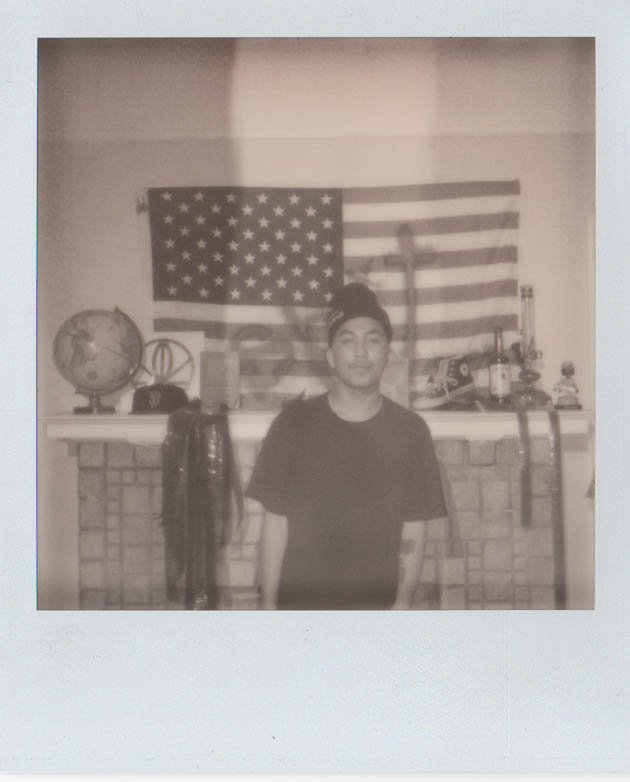Q&A: Alexander Spit leaves his comfort zone
by Chayne Japal
June 4, 2013
The “keep it real” cliché isn’t as popular as it was when Alexander Spit was growing up, bumping hip-hop in his room, but it still seems to be a phrase he lives by. The L.A.-based, Bay-Area raised producer/MC almost single-handedly crafted A Breathtaking Trip To That Otherside, an ideal culmination of his signature dark, psychedelic, trip-hoppy rap sound. In more ways than one, Spit isn’t a “normal” rapper, and he wouldn’t have it any other way. In an effort to remain true to his art and protect his process, he has purposefully avoided association with his contemporaries as much possible. He not only accepts being viewed as a pariah, he thrives on it. Honesty is such a lonely word.
AUX: Thanks for doing this. We’ve been trying to get you since the album release and for some reason we just haven’t been able to lock in until now.
Alexander Spit: Shit happens.
How do you feel about these things? Interviews and press and so on.
To be honest, it’s weird. I think at first I really dug interviews because it’s an opportunity to give some insight, but whenever I finish one, I feel like I failed to mention some crucial point about something.
OK. Well, let’s do it like this. Is there something you want to be sure you say in this interview?
That’s dope. I guess this is it: The lines have been skewed for our generation, and this is beyond music as well. People would say something is organic when it’s not really organic. It’s more of a gimmick or a marketing tool. People say an artist is independent or underground when they’re backed by major label disguised as an indie. I am the exact artist that I say I am. I try to embody the artist that doesn’t try to conform to any generic mould. I try to embody that through my music, my songwriting, my production, every manifestation of who I am. How I dress, the graphic design and aesthetic of what I do. I really don’t like the idea that, in this day and age, we’re given an opportunity, via the Internet, to be as original as we want and create our own movements but people are still using the same formula that people in the industry are using. I’ll be the alternative to that. If you want to hear the same drum patterns and the same rap cadence on the track, don’t look for Alexander Spit’s music, essentially.
What’s the hardest part of sticking to this principle? Isn’t hard to avoid getting caught up in the flow of things?
As an artist, it’s in your true nature to create. That’s what gives you personal satisfaction and true happiness. Yet, being a human being in this society, you’re going to want to receive reward and praise for the hard work you put in. So, it’s hard to make sure those don’t intersect. You have to find the fine line between doing pure art and getting people to pay attention to it. That’s why it’s so important for me to know exactly who I am and to just have the self-identity and spine to hold on to that. This is something I like doing. I physically like making beats and writing rap songs. I like the culture of making music and everything that goes along with that. That’s what I find happiness in. And the best part about it is that I’m in a place where I have the opportunity to do that and have people pay attention to it.
So, how did this love of rap-making come about?
I consider it a manifestation of me being a social-outcast rebel. Hip-hop kind of found me because of that. If I was the type of kid that paid attention in school all day, focused on my academics, being friends with the most people, getting cliqued up with the coolest kids, and trying to holler at the cutest girls I don’t think hip-hop music would have fell into my lap. It did because I didn’t care about all that other mundane shit. The main message that I always got out of hip-hop music, not the mainstream stuff, but hip-hop music was “be yourself.” It praised being different. So it went from me being a social outcast to me sitting in my room listening to rap music. Then I would learn them and rap along. Then it turned into me freestyling with the homies. Next, I was learning to make beats for myself so I could record my raps over them.
Tell me a bit about the concept for this album, A Breathtaking Trip To That Otherside?
It’s a time capsule of where I was at that period in my life. I was partying everyday, taking a lot drugs trying to figure out my own personal life. As a result, the ideas of “psychedelia” and internal thinking and being introspective about everything in my life become the journey of the album; the social and also personal commentary on that idea, trying to find meaning behind everything.
Before this album, collaborations with other rappers wasn’t something you dabbled in all that much but, here, you have guys like E-40, Mr. MFN eXquire, Action Bronson and the Alchemist turning in guest spots for you. Can you tell me a bit about that?
To be 100 percent honest, it was something that I wasn’t really comfortable with at first, but I was in a place in my career where I had that opportunity and it was something was a mutual thing. I’m lucky enough to have a good team behind me that’s immersed in the culture. With people in my circle being friends with those artists, it made the introductions more natural rather than e-mailing somebody’s manager and asking them to hop on a verse on a track by somebody they’ve never heard of before. Really, it was something I didn’t want to do at first but I ended up liking it because it was something out of my comfort zone. Also, there’s this dope competitive thing where if somebody’s spitting bars and you’re shit and they’re killing it, you have to kill it too. It’s like artist exercise for me.
You talked a bit before about being different and your ethnicity sort of fits in with that. What’s your experience been like so far especially with hip-hop being the race-conscious community that it is?
I catch myself finding weird situations where questions come up because people aren’t used to seeing a Filipino guy rapping. I feel like today’s society doesn’t really know how to categorize a Filipino artist. If a black or white artist was doing the same thing that I was doing it would be categorized as cutting edge or brand new but because people don’t know what a Filipino’s role is in today’s society, I feel like I’m just viewed as…neutral. I just take it as a responsibility to try to sway people’s opinion on that.
What have you been up to recently?
For the last four months I’ve been in one of the harshest creative periods of my life. I’ll sit and work on a beat and it may be good but then I’ll feel underwhelmed by it. I’m feeling underwhelmed by most of the music I’ve been writing as of late. I’m realizing that I’m at a point where I have really high standards for the things I do. I’m very much trying to push myself as an artist and, in a way, push the culture itself because I don’t see it happening. I think a lot of people are playing it safe. I understand that people want to do what works but I don’t care about what works. I’m trying to embody something bigger than that.

Brick Stowell
5 albums that Alexander Spit recognizes as essential to his artist DNA
Atmosphere – God Loves Ugly
“One of the albums that got me into rap music and helped me to solidify the idea that it’s cool to be different.”
Portishead – Dummy
“The first time I heard some really different music that still had some appeal to any listener.”
Brother Read – Rap Music
“When I was around 18, this album got me into more mainstream music. This is the first time I heard artists use forward-thinking ideas and forward-thinking production but make it palatable to a wide range of audiences.”
Outkast – Aquemeni
“The first time I heard style used really well in a way that was trippy and crazy, just something that only they could do. Whenever somebody else tried to mimic that I knew it was a carbon copy bite of Outkast.”
Kanye West – The College Dropout
“I remember at that time, all I knew about Kanye was that he made a bunch of beats on Jay-Z’s shit and some other Roc-A-Fella stuff. I thought I had an idea of who he was a producer but when I listened to this, I felt the same but I realized there’s a lot more layers to him. He is very much an artist in the mainstream realm pushing the envelope whether or not people realize it.”

This article originally appeared in the June 2013 Issue of AUX Magazine.
Download and subscribe for free in the app store.
Tags: Music, Featured, Interviews, alexander spit, AUX Magazine





